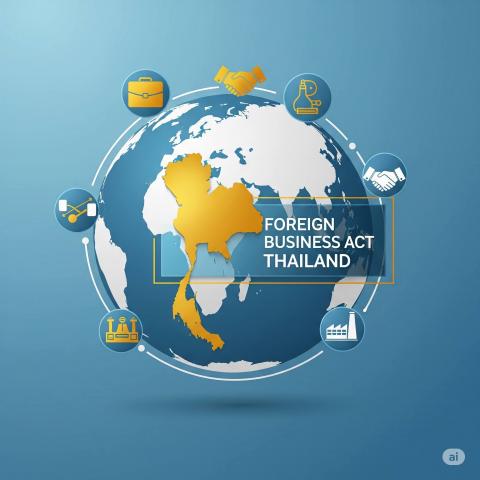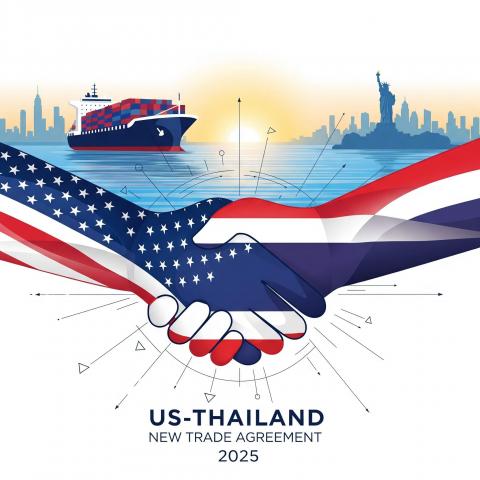Can a Foreigner Hold 100% Share in Thailand? Navigating Ownership Rules
Thinking of starting a business in Thailand? Understanding foreign ownership rules is key. Generally, Thai law limits foreign shareholding, but exceptions exist.
For many foreign investors looking to establish a presence in Thailand, the question of ownership percentage is a primary concern. Can a foreigner own 100% of a company in the Kingdom? The straightforward answer is: it depends. While Thailand generally promotes foreign investment, there are specific regulations in place, primarily governed by the Foreign Business Act B.E. 2542 (1999) (FBA), that restrict certain business activities for majority foreign-owned companies.
The FBA categorizes business activities into three lists:
- List 1: Businesses strictly prohibited to foreigners.
- List 2: Businesses that foreigners can operate only with a license from the Minister of Commerce with Cabinet approval. These often relate to national safety or security, arts, culture, traditional industries, and natural resources.
- List 3: Businesses where Thai nationals are not yet considered ready to compete with foreign companies. Foreigners can engage in these activities by obtaining a Foreign Business License (FBL) from the Director-General of the Department of Business Development with the approval of the Foreign Business Committee. Many service businesses fall under this category.
A company is generally considered "foreign" if 50% or more of its shares are held by non-Thai individuals or entities. Such companies must comply with the FBA and may need an FBL to operate, depending on their business activities.
Pathways to 100% Foreign Ownership
Despite these restrictions, there are several avenues through which a foreigner can legally hold 100% of the shares in a Thai company:
1. Businesses Not Restricted by the Foreign Business Act:
Certain business activities are not covered by the FBA lists and therefore do not have foreign ownership restrictions. Manufacturing for export is a common example. Companies solely engaged in exporting goods may be 100% foreign-owned without requiring an FBL.
2. Promotion by the Board of Investment (BOI):
The Thailand Board of Investment (BOI) is a government agency that promotes investment in specific industries and activities that are beneficial to the Thai economy. Companies receiving BOI promotion can be eligible for various incentives, including permission for 100% foreign ownership, even in some activities otherwise restricted under the FBA. They will also receive a Foreign Business Certificate instead of needing to apply for the more complex FBL. BOI-promoted activities often include technology-based industries, research and development, manufacturing for export, and other sectors targeted for growth.
3. The U.S.-Thailand Treaty of Amity and Economic Relations:
American citizens and U.S.-incorporated companies benefit from the Treaty of Amity. This treaty allows American nationals to own a majority share or 100% of their business in Thailand and engage in a broad range of business activities on the same basis as Thai nationals. Companies seeking protection under the Treaty of Amity must apply for certification from the U.S. Commercial Service in Thailand and then typically apply for an FBL, which is usually granted more readily for treaty-protected entities. However, certain sectors are excluded, such as communications, transportation, fiduciary functions, banking involving depository functions, and the exploitation of land or other natural resources.
4. Obtaining a Foreign Business License (FBL):
For businesses falling under List 2 or List 3 of the FBA, obtaining an FBL is a direct way to operate with majority or 100% foreign ownership. The application process involves demonstrating benefits to Thailand, such as technology transfer, job creation, or investment in specific areas. The approval is discretionary and can be a lengthy and complex process.
Important Considerations:
- Nominee Shareholders: Using Thai nominee shareholders to circumvent foreign ownership restrictions is illegal in Thailand and can lead to significant legal penalties for both the foreigner and the Thai nominee. Authorities are vigilant in investigating such structures.
- Minimum Capital Requirements: Foreign-owned companies, especially those requiring an FBL or BOI promotion, often have specific minimum capital requirements that must be met.
- Professional Legal Advice: Navigating Thai business registration and foreign ownership laws can be complex. It is crucial to seek advice from a qualified legal professional in Thailand to ensure compliance and choose the most appropriate structure for your business.
In conclusion, while the general rule limits foreign ownership to 49% in many sectors, various legal pathways allow foreigners to hold 100% of the shares in a Thai company. The most suitable option will depend on the nature of the business, the nationality of the investor, and the willingness to engage with processes like BOI promotion or FBL application.
Frequently Asked Questions (FAQ)
Q: What is the Foreign Business Act (FBA)?
A: The FBA is a Thai law that restricts certain business activities for companies where 50% or more of the capital is owned by foreigners. It aims to protect Thai businesses and industries.
Q: Is it easier for U.S. citizens to own 100% of a company in Thailand?
A: Yes, due to the U.S.-Thailand Treaty of Amity, U.S. citizens and companies can often obtain 100% ownership for many business activities, though some restrictions apply and a certification process is required.
Q: What are the benefits of BOI promotion for foreign investors?
A: BOI promotion can offer significant benefits, including permission for 100% foreign ownership, tax incentives (like corporate income tax holidays), easier issuance of work permits for foreign staff, and permission to own land for promoted activities.
Q: What happens if I use Thai nominee shareholders?
A: Using Thai nominee shareholders to hide foreign ownership is illegal and carries severe penalties, including fines and imprisonment for both the foreign beneficial owner and the Thai nominee. The company structure could also be invalidated.
Q: Do I always need a Foreign Business License if my company is majority foreign-owned?
A: Not necessarily. If your business activity is not restricted under the FBA, or if you receive BOI promotion, or qualify under the Treaty of Amity (for U.S. nationals), you may not need a separate FBL, or you might receive a Foreign Business Certificate through the BOI process which serves a similar purpose.
External Links
- Thailand Board of Investment (BOI)
- Department of Business Development (DBD), Ministry of Commerce (Information on FBA may be found here, often in Thai with some English summaries)
- U.S. Department of State - U.S.-Thai Treaty of Amity Information




